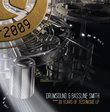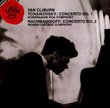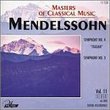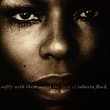| All Artists: Felix Mendelssohn, Eugene Ormandy, Columbia Symphony Orchestra, Philadelphia Orchestra, Rudolf Serkin, Isaac Stern Title: Mendelssohn: Piano Concertos Nos. 1 & 2; Violin Concerto Members Wishing: 0 Total Copies: 1 Label: Sony Original Release Date: 1/1/2002 Re-Release Date: 1/29/2002 Genre: Classical Styles: Chamber Music, Forms & Genres, Concertos, Historical Periods, Classical (c.1770-1830), Instruments, Keyboard, Strings Number of Discs: 1 SwapaCD Credits: 1 UPC: 696998984226 |
Search - Felix Mendelssohn, Eugene Ormandy, Columbia Symphony Orchestra :: Mendelssohn: Piano Concertos Nos. 1 & 2; Violin Concerto
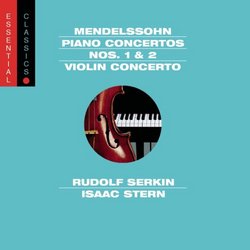 | Felix Mendelssohn, Eugene Ormandy, Columbia Symphony Orchestra Mendelssohn: Piano Concertos Nos. 1 & 2; Violin Concerto Genre: Classical
![header=[] body=[This CD is available to be requested as disc only.]](/images/attributes/disc.png?v=a4e11020) ![header=[] body=[This CD is available to be requested with the disc and back insert.]](/images/attributes/disc_back.png?v=a4e11020) ![header=[] body=[This CD is available to be requested with the disc and front insert.]](/images/attributes/disc_front.png?v=a4e11020) ![header=[] body=[This CD is available to be requested with the disc, front and back inserts.]](/images/attributes/disc_front_back.png?v=a4e11020) |
Larger Image |
CD DetailsSimilar CDsSimilarly Requested CDs
|
CD ReviewsRESURRECTIONIST DAVID BRYSON | Glossop Derbyshire England | 02/21/2004 (5 out of 5 stars) "Mendelssohn's violin concerto has never dropped out of favour, popular or (I hope) critical, but his piano concertos have been palely loitering in a strange limbo for as long as I can remember. Mendelssohn's general reputation took a serious nosedive, ably propelled by Shaw among others, as far back as the 1880's. Tovey made a fainthearted and condescending attempt to right matters, but he too described the piano concertos as 'faded'. They are still not real crowd-pullers in the concert repertory despite their great virtuosic difficulty, but I have noticed in recent years that they have become favourites with the more formidable contestants in various competitions for young musicians, so that is something at least.Such recovery as the piano concertos have made in popular interest probably happened about 35 years ago. I was listening in a semi-attentive way to a BBC radio record review in which the presenter mentioned that his enthusiasm had been reawakened by a new recording, a sequence from which he played for us. There was some brisk right-hand work followed by a darting downward thrust of the left and I knew in one instant 'Serkin'. He was then the height of fashion, before the Russians hit the scene, and his style was near the top of the consciousness of many classical music enthusiasts at the time. His approach still seems to be the favoured approach insofar as the pieces can be described as favoured at all. Broadly it can be described as 'take the outer movements as fast as human fingers can traverse a keyboard', and that is the way the youngsters are going at these concertos. Some years later Perahia took a very different approach, less hammer-and-tongs, more as one would expect Perahia to approach anything, all refinement, smoothness and urbanity. It is a beautiful record, I own it, but it has not established a new school. Serkin still rules in this slightly obscure little kingdom. Those who know his work will know that there was a lot more to him than hammer-and-tongs virtuosity, which in fact seems to have been what made Mendelssohn's own performances of the works notable too. That peculiar burning cantabile is here at its most intense, and of course so is his unique and inimitable rhythmic poise.In fact I am myself ever so slightly lukewarm as regards Mendelssohn's piano concertos, but I am also perfectly convinced that they do not deserve the obscurity that has befallen them when certain productions by Tch**k*vsky, L*szt and the infinitesimal Gr**g still pull the crowds. Record-collectors of refined taste and informed sensibility ought to spend a few bucks on them, this set and Perahia's too. As for the violin concerto, the number of outstanding performances that I have heard is as the sands of the sea without number. I don't recall a better one than this by Stern, who incidentally has done the best Brahms concerto I know, which is saying a lot. If you already own one, or two, or twenty-five superlative versions you can afford to miss this one. The piano concertos I suggest are nothing so optional." A must in your collection Hiram Gomez Pardo | Valencia, Venezuela | 06/20/2004 (5 out of 5 stars) "The piano concerts are ornamental works , and never reach the peak of the champions . They are deeply lyrical and inmersed in the mood of that age signed by the virtuosistic mood. Think in those forty years , Thalberg , Herz, Czerny , Henselt , Moscheles , Bronsart and Liszt to name the most remarkable. In that generation it was more important the show itself that the music could mean. The romanticism in its peak , with all his effects over the great audiences . Transcriptions for piano , fireworks , eight hours concerts , where the music felt in a show business. Only Schumann , Chopin , Brahms among others could keep the level in their works. And we had to expect for the second half of the century for that show fever eventually dissapeared. The violin concerto in this case was the best work in the genre of the concerts. In my opinion , F.M. will be reminded by his string quartets , his last three symphonies and this violin concert. Stern gives to that work , eloquence , majesty and dignity . And the only version I remember to that level is Szigetti Beecham . Deep musicality and above all elegance , and nuance. Undoubtly this work itself deserves you to acquire.The Philadelphia strings as always superb and powerful. Ormandy was deeply inspired in that ocassion." Mendelssohn is put on a Serkin-support system Santa Fe Listener | Santa Fe, NM USA | 01/12/2006 (5 out of 5 stars) "The flashy runs in both Mendelssohn piano concertos, particularly the first, haven't redeemed the banality of their musical content, which actually rivals the Liszt concertos--they are diabolically humdrum while Mendelssohn is academically humdrum. Serkin didn't care about their low status. He pitches into both works as if they are incendiary masterpieces, and for as long as he is playing you're held in his spell. The sonics on these 1959 recordings are a bit thin in the orchestral background--the piano is caught very well--so getting the most up-to-date pressing seems like a good idea.
1959 was also the year when Isaac Stern recorded this Mendelssohn Violin Concerrto, and the sound is still respectable, with the violin escaping the nasty edginess found on old budget CDs. Ormandy is quite vigorous here, as in the piano concertos--he was at his best as an accompanist. Where Menuhin takes every opportunity to make a musical point and Heifetz every opportuity to dazzle, Stern is midway between. He isn't introspective, but he plays seriusly. Passagework and intonation are impeccably clean, and although not the most individual reading in the catalog, Stern's is excellent, particularly in a budget release." |

 Track Listings (9) - Disc #1
Track Listings (9) - Disc #1